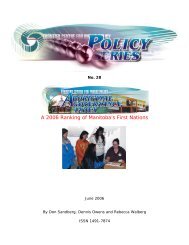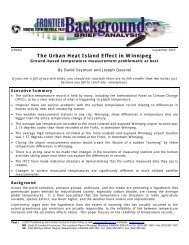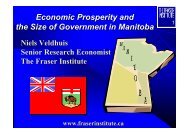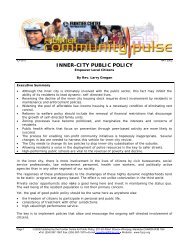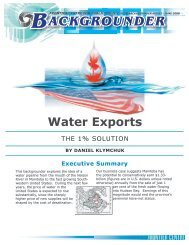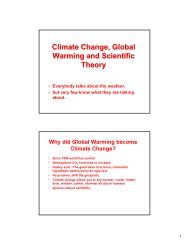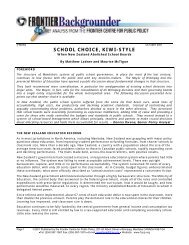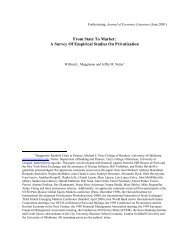View entire study as PDF - Frontier Centre for Public Policy
Create successful ePaper yourself
Turn your PDF publications into a flip-book with our unique Google optimized e-Paper software.
P O L I C Y S E R I E S<br />
FCPP POLICY SERIES NO. 88 • APRIL 2010<br />
Introduction<br />
What is corporate welfare?<br />
The term “corporate welfare” w<strong>as</strong> first<br />
popularized in Canada in the 1970s by<br />
then federal NDP leader Stephen Lewis. In<br />
its simplest definition, corporate welfare<br />
is a payment from government to a<br />
particular business or business sector—<br />
not <strong>for</strong> a good or service provided to the<br />
government—but simply <strong>as</strong> a subsidy<br />
to the business <strong>for</strong> a variety of re<strong>as</strong>ons<br />
and justifications: the ostensible creation<br />
or retention of job, the notion extra tax<br />
revenue will be created and the desire<br />
to save a particular industry in a specific<br />
vote-rich region are among other explicit<br />
and implicit justifications.<br />
In short, corporate welfare is a business<br />
subsidy, but this is just one of the other<br />
names by which it is known. Less accurate<br />
and somewhat misleading descriptions<br />
such <strong>as</strong> “targeting,” “incentives,” “investment”<br />
and a plethora of other terms<br />
illustrate George Orwell’s point that the<br />
English language can be abused by lessthan-clear<br />
terminology.<br />
Made-to-order studies on<br />
corporate welfare<br />
The literature on corporate welfare can<br />
generally be divided into two camps. The<br />
first camp, with made-to-order studies<br />
on behalf of a particular business or<br />
sector, avoids a full accounting of the<br />
cost of a subsidy to the wider economy.<br />
Such studies are often of the “if you build<br />
it they will come” variety, be it a new<br />
sports stadium built with public funds,<br />
an automotive factory given a subsidy<br />
to locate in one province or state over<br />
another or a green subsidy in an attempt<br />
to develop a new product.<br />
MONEY FOR NOTHING AND YOUR CHEQUES FOR FREE<br />
Such studies often deliberately focus<br />
on jobs, tax revenues and the economy<br />
in one concentrated geographic area,<br />
ignoring the wider, negative impact upon<br />
jobs, tax revenues and the economy<br />
across a province/state, country or<br />
internationally.<br />
However, such studies are favourites of<br />
automotive and aerospace companies<br />
seeking handouts from one national government<br />
while making the same pitch to<br />
another, or, the film sector that plays one<br />
state or province off another in its search<br />
<strong>for</strong> subsidies and regional development<br />
agencies that claim yet another large<br />
dollop of public c<strong>as</strong>h will right all that ails<br />
their particular area/industry.<br />
Examples of non-peer reviewed research<br />
and claims that <strong>as</strong>sert the benefits of<br />
subsidies are not difficult to find. Here are<br />
just a few:<br />
• In 2010, the Atlantic Canada Opportunities<br />
Agency (ACOA), a taxpayer-funded<br />
federal agency which directs much of the<br />
money <strong>for</strong> business subsidies in Atlantic<br />
Canada, claimed that <strong>for</strong> every one dollar<br />
it “invested” directly in businesses, over<br />
seven dollars were generated in gains to<br />
the region’s GDP. The agency also claims<br />
to have generated $865 million in tax<br />
revenues due to its existence (ACOA,<br />
2010).<br />
• In 2008, the Ontario Manufacturing<br />
Council published a <strong>study</strong> which<br />
advocated a bail-out of General Motors<br />
and Chrysler. The <strong>study</strong> <strong>as</strong>serted up to<br />
592,000 jobs would be lost in Ontario<br />
if the two automotive companies were<br />
not rescued via government intervention<br />
(<strong>Centre</strong> <strong>for</strong> Spatial Economics, 2008).<br />
7<br />
© 2010<br />
FRONTIER CENTRE




